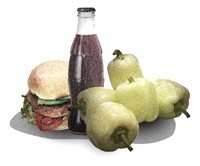Good nutrition is a fundamental necessity that not everyone in Manitoba gets
According to the United Nations Food and Agriculture Organization, 1.02 billion people around the world go hungry every day. That’s one in six people that are starving on a daily basis.
Although a large proportion of this population are found in Third World countries, hunger is also a very real problem much closer to home – right here in Manitoba.
Over 40,000 people in the province are going hungry and require assistance from Winnipeg Harvest. Nearly half of the people accepting food aid are children.
Winnipeg Harvest reports a strong link between socioeconomic status and health problems.
Taking steps to eliminate poverty and hunger work hand in hand to building a community of able-bodied people.
Good nutrition is a fundamental necessity that everyone has a right to. When children grow up with inadequate nutrition, they are at an increased risk of health concerns such as diabetes and heart disease. They are more likely to develop problems with cognitive functioning and often suffer psychologically and socially, as well as physically.
Hungry people come to the University of Winnipeg Students’ Association Foodbank every week to feed their families. The UWSA Foodbank relies on donations from those who can afford the basic necessities.
Unfortunately, what they are receiving simply is not enough each week for well-rounded nutritious meals.
Mladen Kojic, a co-ordinator at the Foodbank, says that not only is the quantity of food a big issue, but the quality of the food donated is also severely lacking.
Donations unfortunately often include junk food with poor nutrient content rather than basic staples and fresh produce.
“Last time we got a bag of chips,” Kojic said. “We need to be distributing real food, not snacks.”
Topping the list of Winnipeg Harvest’s most wanted food items are canned goods (packed in water or their own juices, rather than oils and other additives) and whole grains, such as rice and pasta. These are typical items that those who do not live in poverty frequently have on hand and take for granted. They are easily portable and have a long shelf life, so they are ideal Foodbank donations.
As a non-profit organization, Winnipeg Harvest aims to ensure that everyone is properly fed so that in the future, foodbanks will not be needed. Because the Foodbank operates on a community level, they need everyone’s support to achieve this goal.
A strong and healthy community, however, can only grow and prosper with teamwork.
There are about 55 registered people on the UWSA Foodbank list, but it does also accommodate for walk-ins.
The Foodbank is always looking for more volunteers and food donations.
To learn more about Winnipeg Harvest and how you can get involved, go to www.winnipegharvest.org.
For information about the UWSA Foodbank in particular, check out http://tiny.cc/UWSAfoodbank.
University of Winnipeg student Sagan Morrow writes a health and wellness blog. Check it out at http://livinghealthyintherealworld.wordpress.com.
Published in Volume 64, Number 10 of The Uniter (November 5, 2009)







